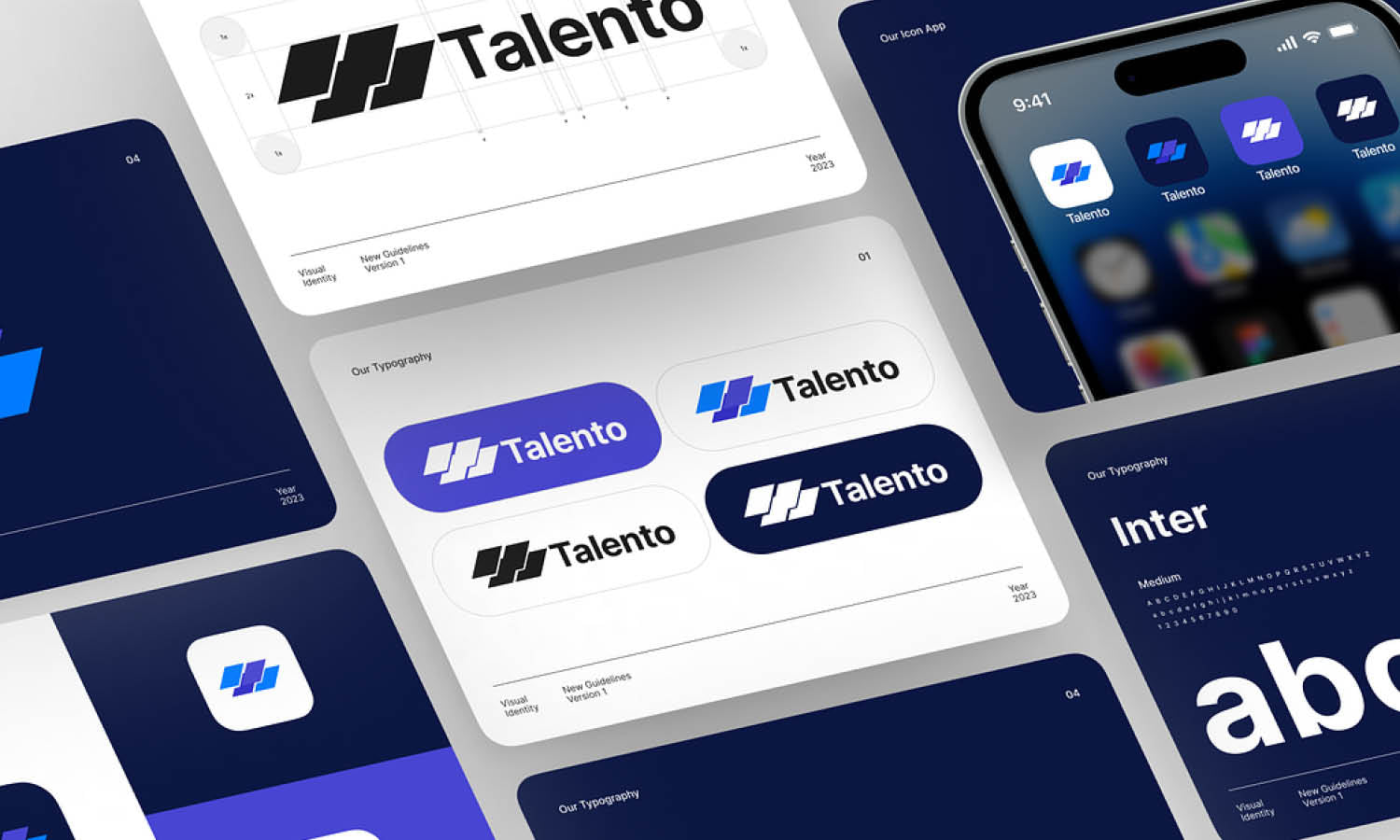Why Small Businesses Should Have a Responsive Logo Design

Source: Rob Batorski, Studio Emilio, Dribbble, https://dribbble.com/shots/15673135-Studio-Emilio/
First impressions happen in an instant—and often on screens of all sizes. For a small business aiming to build brand recognition and trust, having a responsive logo design is no longer optional—it’s essential. Responsive logo design refers to a logo’s ability to adapt seamlessly across various platforms, from mobile apps and websites to printed business cards and signage.
Unlike traditional logos that may appear cluttered or lose clarity when scaled, responsive logos are designed with flexibility in mind. They maintain visual consistency and brand identity whether displayed on a smartphone screen or a large desktop monitor. For small businesses, this means maintaining a strong, professional presence in every customer interaction, regardless of the medium.
A well-designed responsive logo not only preserves the integrity of your brand but also enhances user experience. It ensures that your branding remains legible, stylish, and impactful—no matter the context. In a competitive marketplace, small businesses must prioritize adaptability to meet their audience where they are. A responsive logo design acts as a visual anchor, reinforcing brand credibility and helping businesses stand out with consistency and confidence.
Professional Image
For small businesses, the impact of a professional image cannot be understated, and a well-crafted responsive logo is a cornerstone of this image. A logo that looks good and functions well in various contexts projects professionalism and attention to detail, qualities highly valued by consumers. This professionalism fosters trust and credibility among potential customers, which is particularly crucial for small enterprises competing against larger brands.
A responsive logo not only looks aesthetically pleasing but also conveys that a business is modern and up-to-date with current trends and technologies. It suggests that the company is thoughtful about how it presents itself in all spaces, digital or physical. This level of professionalism in branding can significantly differentiate a small business in a crowded market, attracting more customers and retaining them through consistent, positive brand experiences.
Adaptability Across Devices
In the era of mobile-first strategies, the adaptability of a logo across various devices stands as a paramount concern for small businesses. A responsive logo design ensures that whether a customer views the logo on a smartphone, tablet, or desktop computer, it remains perfectly legible and visually compelling. This adaptability is crucial not only for maintaining visual integrity but also for enhancing user interaction with the brand.
Responsive logo designs often involve creating multiple versions of a logo, each tailored to different screen sizes and resolutions. This might include a simplified version that retains key visual elements for small screens, and more complex versions for larger displays where finer details can be appreciated.
By prioritizing adaptability in logo design, small businesses ensure that their brand identity is consistently presented, no matter the medium. This seamless transition across devices helps in building a stronger connection with the audience, as they recognize and trust the brand image, irrespective of how or where they encounter it.
Improved User Experience
An integral component of effective branding for small businesses is ensuring an optimal user experience, and a responsive logo design significantly contributes to this. A logo that adjusts well to different media and devices enhances the user's interaction with the brand, maintaining clarity and recognizability no matter the context. This adaptability ensures that customers do not struggle to identify the brand on smaller screens or when presented in different formats.
Moreover, a responsive logo helps maintain a professional appearance across all platforms, reinforcing the brand’s message and values consistently. This consistency plays a crucial role in user experience by eliminating confusion and strengthening brand recall. It allows customers to form a reliable and positive perception of the brand, fostering a sense of familiarity and trust.
Furthermore, responsive logos are designed to be visually effective and unobtrusive, contributing to a clean and organized layout on digital platforms. This not only makes navigation easier but also enhances the overall aesthetic appeal of the brand's digital presence. For small businesses aiming to make a significant impact in a competitive market, focusing on user experience through responsive logo design is a strategic approach that can lead to increased customer satisfaction and loyalty.

Source: Andreas Pedersen, Berlingo Media, Dribbble, https://dribbble.com/shots/19838902-Berlingo-Media
Cost Efficiency
For small businesses, budget management is often a critical challenge. Investing in a responsive logo design is a cost-efficient strategy that pays dividends across the marketing spectrum. By creating a versatile logo that scales and adapts to various mediums and sizes, a business can avoid the need for multiple logo redesigns as it expands or updates its marketing channels.
A responsive logo is crafted to perform optimally in multiple scenarios, which means that a single design is suitable for everything from a tiny favicon to a large billboard without the need for further modification. This universality can significantly reduce design and development costs associated with adapting a logo for different formats or campaigns.
Additionally, a responsive logo minimizes the risk of brand fragmentation—a common issue where different versions of a logo create inconsistency in brand perception. Maintaining a coherent brand image without additional investments in redesign or adjustments contributes to a more streamlined marketing budget.
This approach not only saves money in the short term but also ensures that the brand remains flexible and adaptable to future technological changes without further financial outlay. For small businesses, this means their investment in a responsive logo design continues to benefit them as they grow, adapt, and evolve in the dynamic digital landscape.
Enhanced Brand Recognition
Brand recognition is pivotal for small businesses striving to carve out a space in competitive markets. A responsive logo design significantly contributes to this by ensuring the logo maintains its impact and recognition across all platforms and sizes. This consistency is vital as consumers interact with brands through multiple touchpoints, from mobile devices to desktop screens to print media. A logo that adapts well across these mediums is more likely to be remembered and associated with positive user experiences.
A responsive logo also supports marketing strategies by making the brand easily identifiable in various contexts, whether it's a digital ad, a social media post, or corporate merchandise. This flexibility means that the logo can be deployed effectively in numerous marketing initiatives without losing its essence or effectiveness. For small businesses, this can lead to an increase in brand awareness and, subsequently, a more robust customer base.
Furthermore, the repeated exposure of a consistent logo enhances customer recall and loyalty, which are essential for brand growth and sustainability. By investing in a responsive design, small businesses ensure that their brand remains prominent and recognizable, even as the market evolves and new platforms emerge. This strategic approach not only strengthens brand identity but also solidifies its presence in the consumer's mind.
Scalability
Scalability is a critical aspect of logo design, particularly for small businesses that aspire to grow and expand their market reach. A responsive logo design is inherently scalable, meaning it maintains its clarity and impact regardless of size or application. This ability to scale effectively is crucial as it ensures the logo remains functional and aesthetically pleasing on everything from large billboards to small wearable items like pins or business cards.
The technical execution of a scalable logo involves creating a design that is simple yet distinctive, avoiding overly complex details that might get lost at smaller sizes. This simplicity does not compromise the logo’s uniqueness but rather ensures it can be easily recognized and processed by viewers at any scale.
Additionally, a scalable logo accommodates various marketing needs without additional adaptation costs. As the business grows and its applications of the logo diversify—ranging from digital formats to print media—the logo continues to perform optimally without the need for redesign. This not only saves on design costs but also ensures that the brand image remains consistent across different mediums and scales.
Versatility in Marketing
For small businesses, the versatility of a logo in marketing initiatives is essential. A responsive logo design offers the adaptability required to ensure that the logo performs well across a diverse range of marketing materials. Whether it’s digital advertising, print media, or promotional products, a responsive logo can be adjusted to fit different formats while maintaining its integrity and effectiveness. This versatility is particularly valuable for small businesses that must maximize every marketing opportunity without the resources to design multiple logos for different uses.
A responsive logo can transition smoothly from an online banner to a storefront sign to a mobile app icon, ensuring that the brand is consistently represented in all marketing efforts. This consistent visibility helps to reinforce the brand identity and aids in building a strong, cohesive marketing strategy. It allows businesses to be agile, adapting their marketing to different contexts and audiences without losing the impact of their brand.
Moreover, the ability to use a single logo across various platforms not only simplifies branding efforts but also ensures that all marketing materials are aligned, which can enhance the overall effectiveness of the marketing campaign. For small businesses looking to establish a foothold and grow their market presence, a responsive logo is an invaluable tool that supports dynamic and effective marketing.

Source: Jack R, Neatsy App - AI Doctor in a Phone, Dribbble, https://dribbble.com/shots/19622660-Neatsy-App-AI-doctor-in-a-phone
Ease of Integration
The ease of integration offered by a responsive logo design is a significant advantage for small businesses. A well-designed responsive logo seamlessly fits into a variety of business applications, from digital assets like websites and social media profiles to physical materials such as business cards and product packaging. This compatibility reduces the complexity and cost associated with adapting the logo for different uses, making it easier for small businesses to maintain a cohesive brand identity across all touchpoints.
A responsive logo is designed to work effectively within various layout constraints and color palettes, making it versatile enough to be used in a wide range of applications without requiring modifications. This flexibility is crucial for small businesses that often need to pivot quickly and adapt their branding to new products or markets without the delay or expense of redesigning their logo.
Furthermore, the integration extends beyond just the visual appearance. A responsive logo aligns with the brand’s values and message, ensuring that these core components are consistently communicated, regardless of the medium. This consistency strengthens the brand’s message and enhances its visibility and recognition in the market.
Supports Brand Consistency
Brand consistency is a cornerstone of effective branding, especially for small businesses aiming to establish a foothold in competitive markets. A responsive logo design plays a critical role in maintaining this consistency across various media and platforms. By ensuring that the logo appears the same in digital and physical formats, businesses can reinforce their brand identity and make their mark memorable.
Consistency in branding fosters trust and reliability in the eyes of consumers. When a logo is consistently displayed across all touchpoints, it builds a unified brand experience that enhances consumer recognition and loyalty. This is crucial for small businesses that often rely on repeat customers and word-of-mouth recommendations.
A responsive logo adapts to different sizes and contexts without losing its essence, ensuring that the brand is not only recognized but also respected for its professional presentation. Whether it’s displayed on a tiny mobile screen or a large billboard, the logo retains its impact, conveying the business’s core message effectively.
For small businesses, achieving brand consistency through a responsive logo design means less confusion for customers and more opportunities to make a lasting impression. It eliminates discrepancies between how the brand is perceived online versus offline, providing a seamless customer experience that supports business growth and brand equity.
Alignment with Modern Design Trends
Keeping up with modern design trends is essential for small businesses looking to remain competitive and relevant in today’s fast-evolving market. A responsive logo design aligns a small business with the latest advancements in digital design, demonstrating a commitment to innovation and current standards.
Modern design trends often emphasize simplicity, versatility, and scalability—qualities inherent in well-executed responsive logos. These designs are not only practical but also aesthetically aligned with contemporary preferences, which favor clean, minimalist graphics that look good on various devices and in diverse contexts.
Incorporating a responsive logo shows that a business is forward-thinking and adaptable to technological changes. This alignment can be particularly appealing to a tech-savvy audience that values brands that embrace technological advancements. Additionally, it positions a small business as a progressive entity, capable of adjusting to the digital demands of the marketplace.
Moreover, as design trends shift towards more dynamic and flexible branding strategies, having a responsive logo ensures that small businesses are not left behind. It allows them to participate fully in the digital landscape, enhancing their visibility and engagement with modern consumers who expect brands to deliver seamless experiences, both online and offline.
Conclusion
Every small business can benefit from investing in a responsive logo design. As digital platforms continue to evolve, having a logo that adjusts smoothly across devices and environments is crucial for maintaining a cohesive brand image. A responsive logo ensures your business looks professional and reliable whether viewed on a mobile screen, tablet, or printed material. It communicates adaptability, attention to detail, and brand strength—qualities that resonate with modern consumers. For small businesses striving to grow and compete in crowded markets, a well-thought-out responsive logo design is a smart and lasting investment in brand identity.
Let Us Know What You Think!
Every information you read here are written and curated by Kreafolk's team, carefully pieced together with our creative community in mind. Did you enjoy our contents? Leave a comment below and share your thoughts. Cheers to more creative articles and inspirations!
















Leave a Comment